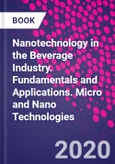Nanotechnology in the Beverage industry: Fundamentals and Applications looks at how nanotechnology is being used to enhance water quality, as well as how the properties of nanomaterials can be used to create different properties in both alcoholic and no-alcoholic drinks and enhance the biosafety of both drinks and their packaging. This is an important reference for materials scientists, engineers, food scientists and microbiologists who want to learn more about how nanotechnology is being used to enhance beverage products.
As active packaging technology, nanotechnology can increase shelf-life and maintain the quality of beverages. In the field of water treatment, nanomaterials offer new routes to address challenges.
Please Note: This is an On Demand product, delivery may take up to 11 working days after payment has been received.
Table of Contents
PART 1: NANOMATERIALS IN WATER TREATMENT 1. Nanomaterials in ground water treatments 2. Nanomaterials in waste water treatments 3. Nanosensors for water quality control 4. Nanostructure membranes for water treatments 5. Fouling-resistant RO membranes using nanomaterials 6. Water treatment by absorption on nanoparticles (nano-adsorbents) 7. Immobilization of nanoparticles in filtration membrane structures
PART 2: SMART NANOCAPSULES/NANOCARRIERS IN DRINKS 8. CO2 loaded nanocarriers for drinks 9. Aromas and flavours loaded nanocarriers for drinks 10. Dyes loaded nanocarriers for drinks 11. Alcohols loaded nanocarriers for drinks 12. Future trends
PART 3: APPLICATIONS OF NANOTECHNOLOGY FOR HYGIENE OF DRINKS 13. Nanosensors for quality and safety analysis of drinks 14. Nanodevices for detection of pathogens in milk 15. Nano devices for detection of corkage in wine 16. Application of antibiotic nanoparticles in beverage industry 17. Nano-filtration/nano-membranes in beverage industry 18. Corrosion resistance of orthodontic wires in presence of beverages at the nanoscale 19. Future scopes
PART 4: APPLICATIONS OF NANOTECHNOLOGY FOR PACKAGING OF DRINKS 20. Active nano-enabled packaging: An introduction 21. Polymer nanocomposites for drink bottles 22. Nanocoatings for whisky and rum casks (for reducing the natural wastage) 23. Biodegradable nanomaterials for drink packaging 24. Future perspectives








